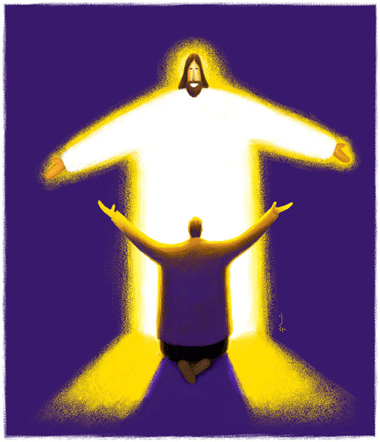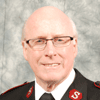 When we enter the world of Christian faith we enter a world of power. The Church sings about power, biblical stories revolve around power and leadership meetings confront issues of power. But what kind of power are we talking about? There is a world of difference between the influential power of a Terry Fox and the destructive power of a tsunami.
When we enter the world of Christian faith we enter a world of power. The Church sings about power, biblical stories revolve around power and leadership meetings confront issues of power. But what kind of power are we talking about? There is a world of difference between the influential power of a Terry Fox and the destructive power of a tsunami.
In this article I would like to explore a theology of power by considering the way Jesus exercised power. In light of this, suggestions will be made regarding our own exercise of power.
Jesus' Exercise of Power
Luke's Gospel is a good place to start our thinking. This Gospel sets the power of the Roman Empire alongside a child in a manger. Both the Emperor Augustus and Mary's Child are called “Lord,” but the manner by which each comes to understand and express power is worlds apart.
As he begins his public ministry Jesus carries out healing acts. And Luke says that “… the power of the Lord was with him to heal” (5:17). Unclean demons are driven out of people, Simon's mother-in-law is healed, a leper is restored in body and to the community, a paralytic is empowered to walk, a Centurion's slave is given life, a widow's son is raised from the dead, a hemorrhaging woman and a synagogue ruler's daughter are given life, and raging waters are calmed. That these are representative of Jesus' ministry is emphasized as he approaches the city of Jerusalem in his final week. Then “… the whole multitude of the disciples began to praise God joyfully with a loud voice for all the deeds of power that they had seen …” (19:37). There is a clear connection between power and the public ministry of Jesus of Nazareth.
While many individuals praised these “deeds of power,” there were those who seemed threatened by them. When scribes and Pharisees watched Jesus heal a man's withered hand on the Sabbath: “they were filled with fury and discussed with one another what they might do to [him]” (6:11). The power of Jesus meant something very different for them. It is necessary to view Jesus' exercise of power against the background of his social world.
We can sense why a culture praises some actions and condemns others when we understand its values. For instance, when Newfoundland and Labrador's premier ordered the Canadian flag removed from provincial buildings people responded with both praise and outrage. This gesture was interpreted by the values held important by the nation's citizens. Social values enable us to interpret actions.
In the first century, honour was a supreme value, and shame was its social opposite. Power was a way to achieve honour, but the social boundaries of the day gave advantages to men, to religious vocations and to those healthy in mind and body. Further out from the centres of power were women, children, tax agents, Gentiles and people disfigured in mind and body. With this social map in view it becomes apparent that Jesus subverted many of the power structures of his day in order to bring honour to the powerless.
In Luke 7:36-50, an unnamed woman pours out her affection for Jesus in a “Pharisee's house.” Simon interpreted this gesture as inappropriate, and turned on both the woman and Jesus. Jesus, however, viewed this action through a different set of values. So he led Simon into the world of those values through a parable, “brokered” power on behalf of the woman, and brought honour to her gesture. Power is expressed through the act of interpretation.
Cultural Definitions
Luke's Gospel also depicts Jesus teaching more intentionally about power, and how he often reverses cultural definitions. In the Sermon on the Plain, the powerless are blessed, the powerful are lamented (6:20-26); when a dispute breaks out among his disciples as to “which one of them was the greatest” Jesus “took a little child and put it by his side” (9:46-48); and moments before his arrest Jesus instructs his disciples in response to a dispute over the notion of greatness: “The kings of the Gentiles lord it over them.… But not so with you …” (22:24-27). Socially accepted norms of power were critiqued by Jesus.
Jesus fought against abuses of the temple system and the placing of Sabbath restrictions above considerations of justice
It is also through this social map of power that we can understand Jesus' warfare against “the powers” of his day. Certainly Jesus overpowered the demonic (see 4:36). But in Luke's world Satan's power was embodied in real individuals and real institutions that opposed God's gift of saving grace. Abuses of the temple system, the placing of Sabbath restrictions above considerations of justice, and Roman power were all “powers” Jesus fought against.
As Jesus approached the city of Jerusalem it is evident that his ministry of power was resisted. He acknowledged his desire to gather Jerusalem to himself “… as a hen gathers her brood under her wings, and you were not willing!” (13:34). Finally, when Jesus “came near and saw the city, he wept over it” (19:41). Jesus was deeply affected by the city's lack of openness to him. Whatever else might be said of Jesus' power, it did not always get its own way.
Luke's Gospel weaves together several threads in its understanding of power. On one hand the power of Jesus is real and transforms individuals and communities. His power, while welcomed by some, is perceived by others as a threat. His “deeds of power,” while effective, were not coercive. It is this paradox of a powerful Christ who suffered death at the hands of “the powers” that stands at the heart of a Christian understanding of power.
Unfortunately, as the Church carried out its mission in the Western world it made power the central attribute of God, and a cultural understanding of power at that. Augustine argued that “the will of the omnipotent is always undefeated.” This same important leader also claimed that God “is not truly called Almighty if he cannot do whatsoever he pleases, or if the power of his almighty will is hindered by the will of any creature.” As the Gospel took root in medieval Europe it came to be clothed in the conceptual vestments of the day. God was a “pillar,” an “Unmoved Mover.” The power of God came to be viewed through the feudal concept of a king's absolute power. As theologian William Placher has argued: “The assumption that God means, first of all, power, runs throughout much of history, and it carries a great deal of accompanying baggage.”
Exercising Christlike Power
It isn't possible in this brief essay to outline a more Trinitarian understanding of power. Let us, however, tease out some threads of our conversation as they relate to a Christlike exercise of power.
First, there is an appropriate exercise of power. Contrary to Lord Acton's dictum, power in and of itself does not necessarily corrupt. True, even Jesus was tempted by a misuse of power. But there is a legitimate place for power, both in persons and in the offices we hold within the Church. Our battle is against “the powers” in our day. Each ministry unit within The Salvation Army is called to express its power for the transformation of persons and communities, beginning with those on the margins of power.
Second, one of our tasks is to analyse social expressions of power in our day. Power brings benefits to some, often at the expense of others. And since power is interpreted we will need to understand how our culture's values relate to power. It seems to me that a primary task within the Army is to develop a good social analysis, both locally and globally. And if teaching is an act of power we need to engage in the kind of teaching that Brazilian educator Paulo Freire calls “the pedagogy of the oppressed.”
Finally, how we exercise power is critical. Jesus did not always get his way with power. It was a power that had the goal of forming covenantal friendships, and this goal conditioned the way Jesus exercised it. Some speak of his power as “self-limiting” in order to realize that kind of relationship. Thus we are called within The Salvation Army to examine how we exercise power, and to look for its impact on individuals, institutions and communities.
The life of Jesus offers us a way to begin thinking about a theology of power. As we view his exercise of power we can begin to sense what it means to speak of the Triune God's way with power. And that power is, in the words of theologian Daniel Migliore, a “strange power.”
 Major Ray Harris is a retired Salvation Army officer. He enjoys watching Corner Gas reruns and running in Winnipeg's Assiniboine Park.
Major Ray Harris is a retired Salvation Army officer. He enjoys watching Corner Gas reruns and running in Winnipeg's Assiniboine Park.









Leave a Comment